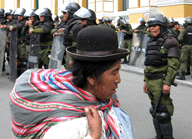
Correa Brings Hope to Ecuadorians
When Ecuadorians went to the polls on Nov. 26 they collectively said no to neoliberalism as they voted overwhelmingly for maverick candidate Rafael Correa over billionaire banana tycoon Alvaro Noboa. The choice between Noboa and Correa was a choice between the past and the future, a future that undoubtedly makes Washington very uneasy as yet another country in Latin America elected a left-of-center candidate.



